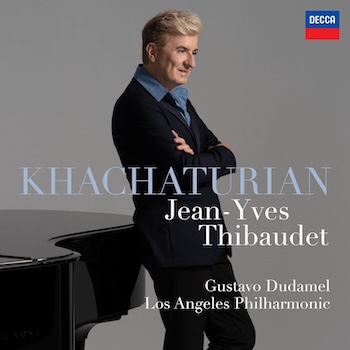Classical Music Album Reviews: “Duke Bluebeard’s Castle” and Jean-Yves Thibaudet Plays Khachaturian
By Jonathan Blumhofer
A conspicuously inviting account of Béla Bartók’s Duke Bluebeard’s Castle, and a welcome surprise: Aram Khachaturian actually wrote a pretty good piano concerto.
 One of the Boston Symphony Orchestra’s finest performances of 2024 involved Karina Canellakis leading the ensemble in Béla Bartók’s one-act opera Duke Bluebeard’s Castle. Now the conductor has made a recording of that score — this time with the Netherlands Radio Philharmonic Orchestra, the group she heads as music director — and it largely lives up to the memory of her local appearance.
One of the Boston Symphony Orchestra’s finest performances of 2024 involved Karina Canellakis leading the ensemble in Béla Bartók’s one-act opera Duke Bluebeard’s Castle. Now the conductor has made a recording of that score — this time with the Netherlands Radio Philharmonic Orchestra, the group she heads as music director — and it largely lives up to the memory of her local appearance.
Bartók’s only opera, Bluebeard draws on an Eastern European folktale first published in 1697. In it, the title character brings his new wife, Judith, to his castle. She’s unsettled by the grim, drab place and insists on opening seven locked doors. Their contents range from terrifying (a torture chamber) to ominous (the Lake of Tears) and culminate in a room holding Bluebeard’s three previous wives, who’ve been locked away for eternity. As the curtain falls, Wife No. 4 joins them.
Though the composer’s gritty style is well suited to this unsettling narrative, Bluebeard isn’t all grating dissonance and chaos. In fact, there’s considerable warmth and color to be found in its pages, not least in its radiant depiction of Bluebeard’s gardens (Door 4) and its famously resplendent evocation of his kingdom (Door 5). Here, and in other spots — like during the long, mysterious Prologue and the denouement introducing Bluebeard’s former wives — Canellakis draws playing of sometimes surprising sumptuousness from her forces.
At the same time, the NRPO’s delivery of Door 1’s tight, ominous runs and Door 2’s bright, crisp textures are impressively precise. What’s more, conductor and orchestra capture much of the dancing energy of this opera: it snaps and lilts with real charm.
Bass-baritone Gabor Bretz imbues the title role with a good deal of richness, clarity, and humanity. If his account of the part doesn’t exactly turn Bluebeard into a sympathetic figure, it’s anything but a caricature — and his entreaties to Rinat Shaham’s Judith to leave well-enough alone and not open the castle’s last doors ring fervently.
The Israeli mezzo-soprano makes for a compelling Judith. She’s got a wonderfully resonant low range and that’s put to good use at various points in this score. But she also had no trouble sailing above the orchestra (the famous high C on the opening of Door 5 sounds effortless) and her chemistry with Bretz is never in doubt.
Taken together, all of this makes for a conspicuously inviting account of Duke Bluebeard’s Castle. It’s well-sung and very well played. If Canellakis doesn’t underline the music’s transitions and eerie bits so much as she might, that’s no real loss: the end result is an interpretation that’s well considered and emotionally charged. Bartók, one might hope, would approve.
 Here’s a welcome surprise: Aram Khachaturian actually wrote a pretty good piano concerto. Of course, when you’ve got Jean-Yves Thibaudet and the Los Angeles Philharmonic Orchestra making the case, that might be a given.
Here’s a welcome surprise: Aram Khachaturian actually wrote a pretty good piano concerto. Of course, when you’ve got Jean-Yves Thibaudet and the Los Angeles Philharmonic Orchestra making the case, that might be a given.
Even so, it’s been a long time since this 1940 effort has been so well served on disc. Too often, the piece comes off as a clunky jumble of dissonances with a weird flexatone solo in the middle of the slow movement. This time around, though, Thibaudet’s approach to the involved solo part is ever clean and focused — and that ensures a very different type of reading.
To be sure, there’s a naturalness to his performance that breathes freely, be that in the expansive first movement or the folk-inflected Andante. The finale, too, with its punchy attacks, random, Rachmaninoff-y episodes, and boldly lucid textures is a trip. Thibaudet also navigates the crunchy cadenza with uncommon purpose and vigor.
His contributions are matched to an uncanny degree by the LAPO and conductor Gustavo Dudamel. Details of balance and instrumentation consistently speak, and the rhythmic presence of the collective is perfectly on-point. For sheer engagement and recorded brilliance, in fact, this might be the finest recording of Khachaturian’s Piano Concerto yet.
For filler, Thibaudet turns in a rich, lovely account of the Adagio from Spartacus and the “Saber Dance” and “Lullaby” from Gayaneh. If none of those, or the solo-piano arrangement of the Masquerade Suite that follows, trump the orchestral originals, the pianist captures many of the music’s enchanting turns of harmony well.
More memorable are six excerpts from Khachaturian’s Pictures of Childhood. For character and precision, you’re not likely to hear these charming miniatures played better, especially the trippy “Birthday Party,” impish “Study,” and winsomely balanced “Legend.”
Jonathan Blumhofer is a composer and violist who has been active in the greater Boston area since 2004. His music has received numerous awards and been performed by various ensembles, including the American Composers Orchestra, Kiev Philharmonic, Camerata Chicago, Xanthos Ensemble, and Juventas New Music Group. Since receiving his doctorate from Boston University in 2010, Jon has taught at Clark University, Worcester Polytechnic Institute, and online for the University of Phoenix, in addition to writing music criticism for the Worcester Telegram & Gazette.
